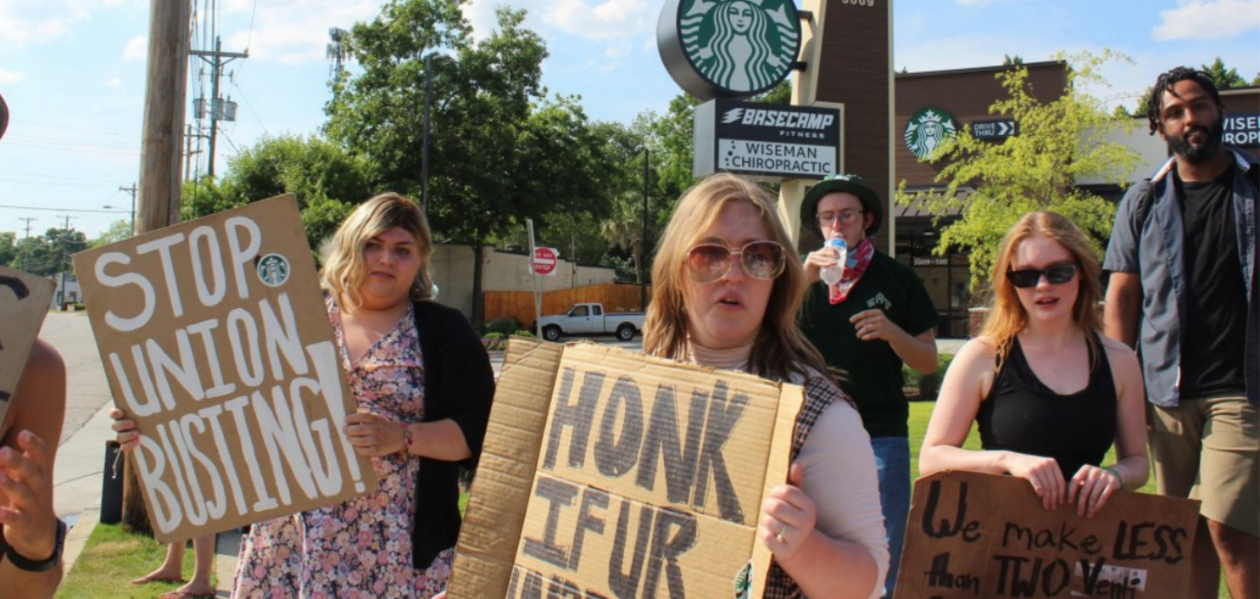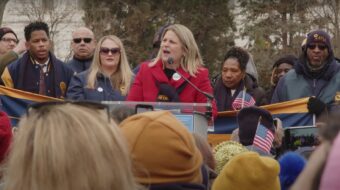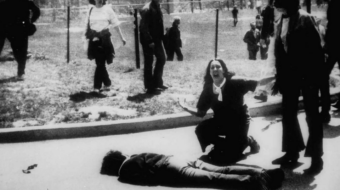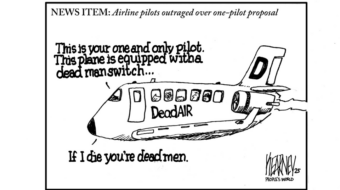
GREENVILLE, S.C. and CARBONDALE, Ill.—A Starbucks Workers United unionizing win, 8-1, in the most anti-union state in the U.S., South Carolina, “will give a lot of hope” to other organizing drives there, a top Carolinian labor historian, Kerry Taylor, says.
And it’s also an indication of the widening ground-up reach of the nationwide organizing campaign, driven by the workers with aid from Workers United, a Service Employees sector.
Starbucks workers are among the current vanguard in the mass uprising of exploited low-wage, overworked employees—retail workers, warehouse workers, fast food workers, adjunct professors, port truckers, and others—from coast to coast.
The workers use the leverage they gained from a tight labor market. The coronavirus pandemic’s forced firings and layoffs let millions of workers take a step back. They realized both unionization and competition give them the opening to demand higher wages and benefits and respect on the job—all of which unionization brings.
Even in South Carolina
In a telephone interview, Taylor, a professor at The Citadel, who is also tri-chair of the South Carolina Poor People’s Campaign, reported the victory at the Starbucks in Greenville. It precedes another Starbucks election result, among 28 workers in the state capital, Columbia. Mail-in ballots will be counted June 3. Starbucks workers have filed National Labor Relations Board (NLRB) union election recognition requests in Sumter and Anderson, S.C., too.

The Columbia Starbucks workers staged a three-day strike in late May to protest company firing of their manager, who refused to cooperate with Starbucks’s union-busting. They returned when, in another anti-union tactic, Starbucks brought in out-of-town workers from other stores to man the Columbia Starbucks’ drive-thru window.
The anti-union tactics against the Columbia workers aren’t stopping other union activism in a state infamous for employer exploitation. Taylor reports the Steelworkers are undertaking an organizing drive at a big tire plant upstate. And teachers unions, the NAACP, and the ACLU lobbied lawmakers against book bans in schools and universities. The banners’ target is a favorite right-wing social issue, critical race theory, an academic idea not taught in schools.
The Starbucks Workers United’s drive in South Carolina is part of its broadening nationwide drive to unionize overworked, underpaid, and often exploited baristas and shift supervisors at Starbucks stores. The number of organizing drives is now far above 200. Wins are at 100—the latest at the Eastlake store in Starbucks’ headquarters city, Seattle—and counting.
Just since May 25, NLRB data shows, Starbucks workers, aided by Workers United, filed NLRB union election petitions in Pittsburgh (40 workers), Denver (40), Clarksville, Ind., just north of Louisville (number not available), Carbondale, Ill. (20), Salem, Ore. (27), Vestal, N.Y. (30), Dallas (15) and Chicago’s Lincoln Village on the North Side (16). On May 25, Workers United won in four out of five store-wide union representation votes in Philadelphia.
There are common threads through all the organizing drives, including problems with working conditions—and with Starbucks not living up to its own reputation, but instead acting like other companies do when faced with unionizing: rampant hostility and the corporate pursuit of profits at the expense of workers and customers.
“Baristas and Shift Supervisors do every bit of physical labor from which you profit. In return, you see us as your biggest and most inconvenient expense,” the Carbondale workers wrote to Starbucks CEO Howard Schultz when announcing their NLRB filing.
“All of our stores are corporate-run and people are not getting the hours they need” to earn a living, Carbondale barista Ken LeBlanc said in a phone interview. “Our manager has even tried to schedule us for more hours, but she keeps getting the corporate response of ‘Too many hours,’” LeBlanc added.

The result, said LeBlanc, is a community-oriented Starbucks store whose workers toil to serve their neighbors, while Starbucks falls short of its stated goals and image. “We’ve tried their ‘partners to management’ road and it doesn’t work.”
There are other problems in the Carbondale store, LeBlanc noted. One is a food case that’s “at ambient temperatures” rather than the cool levels needed to keep food fresh. That upsets workers, as their store is also a haven for Carbondale’s “displaced people”—and the university-dominated city is small enough for store workers to know them by name.
“We have to throw out eight pounds of food every day, and it’s tough to do that” when, if the food had been kept cool, it could have fed the displaced. And until Starbucks brought in a professional janitorial company, baristas had to clean the bathrooms, too. “We had to scrub the drains at night. I don’t know how to get milkfat out of drains,” LeBlanc says.
The NLRB records also show the breadth of company retribution against workers who stand up for themselves. Just since May 25, Workers United has had to file at least 32 labor law-breaking (unfair labor practices) charges against Starbucks nationwide.
They include Illegal firings in Richmond, Va., San Antonio, and Denver, illegal retaliation in Denver, coercive rules and threats there and in La Quinta and Paso Robles, Calif., and illegal interrogation—among other violations—in Nichols Hills, Okla. The latest, on May 31: illegal retaliation against leaders in Mesa, Ariz., after Workers United won the vote there.
“It is not the fault of partners that Starbucks Corporation has found itself beholden to a slew of insatiable shareholders, and each resource you siphon out of this business to feed them takes quality with it,” the Carbondale workers’ letter to company CEO Schultz declares. “Each labor cut bears another sloppy Frappuccino. Each price increase begets another irate customer. This company is deteriorating rapidly, and the customers see it every day.”
Read more:How we won a union at Starbucks by Jen Lenz










